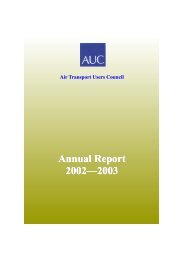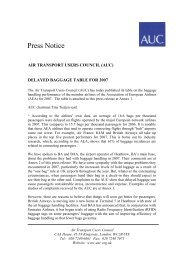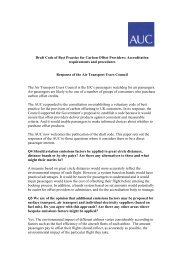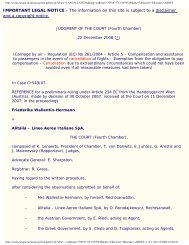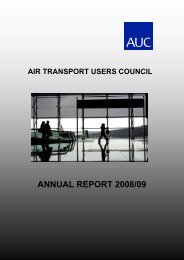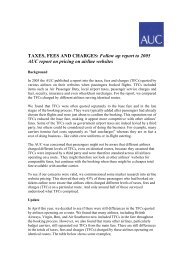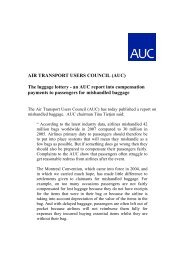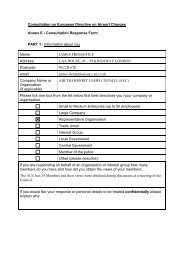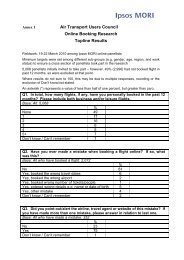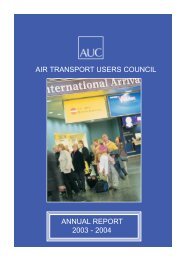auc report on passenger survey - Air Transport Users Council
auc report on passenger survey - Air Transport Users Council
auc report on passenger survey - Air Transport Users Council
You also want an ePaper? Increase the reach of your titles
YUMPU automatically turns print PDFs into web optimized ePapers that Google loves.
AUC REPORT ON PASSENGER SURVEY<br />
Introducti<strong>on</strong><br />
The <strong>Air</strong> <strong>Transport</strong> <strong>Users</strong> <strong>Council</strong> (AUC) is the Civil Aviati<strong>on</strong> Authority’s air<br />
<strong>passenger</strong> watchdog. In additi<strong>on</strong> to handling individual complaints from <strong>passenger</strong>s, it<br />
represents the interests of <strong>passenger</strong>s to regulators, parliamentarians and the industry.<br />
In March this year, we commissi<strong>on</strong>ed Ipsos MORI to carry out c<strong>on</strong>sumer research to<br />
get feedback from <strong>passenger</strong>s in relati<strong>on</strong> to issues of l<strong>on</strong>g-standing AUC interest. We<br />
asked a sample of <strong>passenger</strong>s to list up to five c<strong>on</strong>siderati<strong>on</strong>s (in order of importance)<br />
when buying a ticket. We also asked about their experience in relati<strong>on</strong> to a number of<br />
specific issues. These were<br />
• financial protecti<strong>on</strong><br />
• booking errors<br />
• opti<strong>on</strong>al fees<br />
• refund of taxes, fees and charges<br />
• performance <str<strong>on</strong>g>report</str<strong>on</strong>g>ing.<br />
We planned to use the findings of the research to inform AUC activity in relati<strong>on</strong> to<br />
these issues in the future. The research was intended to complement the intelligence<br />
the AUC already receives from complaints and enquiries. Complaints give early<br />
warning signals of the issues where the market may not be working for <strong>passenger</strong>s<br />
and where there is potential for significant c<strong>on</strong>sumer detriment. C<strong>on</strong>sumer research<br />
can give us complementary insights into <strong>passenger</strong>s’ perspectives <strong>on</strong> these issues.<br />
The results of the <strong>survey</strong> are attached to this <str<strong>on</strong>g>report</str<strong>on</strong>g>. The results for the questi<strong>on</strong>s about<br />
specific issues are at annex 1. A table of the top ten menti<strong>on</strong>s when resp<strong>on</strong>dents were<br />
asked the list up to five c<strong>on</strong>siderati<strong>on</strong>s when booking a ticket are at annex 2.
2<br />
Financial protecti<strong>on</strong> against scheduled airline failure<br />
Key findings<br />
• When we asked <strong>passenger</strong>s to list up to five c<strong>on</strong>siderati<strong>on</strong>s (in order of<br />
importance) when buying a ticket, <strong>on</strong>ly five resp<strong>on</strong>dents menti<strong>on</strong>ed the chance<br />
of an airline going bust (out of a total of 2072 resp<strong>on</strong>dents).<br />
• 30% of resp<strong>on</strong>dents did not know if their last flight was financially protected<br />
or not.<br />
• 34% of resp<strong>on</strong>dents did not know if the last travel insurance policy they<br />
purchased included financial protecti<strong>on</strong>.<br />
• 71% of resp<strong>on</strong>dents agreed that it was important that travel arrangements were<br />
financially protected (scoring at least 7 out of 10 in terms of importance).<br />
• Only 8% of resp<strong>on</strong>dents would definitely not pay extra to be financially<br />
protected when booking a flight.<br />
• 49% of resp<strong>on</strong>dents said that their last flight was financially protected.<br />
The results of the <strong>survey</strong> suggest that people generally do not c<strong>on</strong>sider financial<br />
protecti<strong>on</strong> against the failure of a scheduled airline when they book a ticket. Only 5<br />
out of 2072 people menti<strong>on</strong>ed the chance of an airline going bust when asked to list<br />
up to five c<strong>on</strong>siderati<strong>on</strong>s when booking a ticket. In additi<strong>on</strong>, 30% of <strong>passenger</strong>s did<br />
not know if their last flight was protected and 34% did not know if their travel<br />
insurance included protecti<strong>on</strong>. However, when asked, <strong>passenger</strong>s generally thought it<br />
was important that their flights were protected (table 1). Furthermore, 24% would<br />
pay extra for financial protecti<strong>on</strong>, 36% would c<strong>on</strong>sider it while for a further 14% it<br />
would depend <strong>on</strong> the cost (table 2).
3<br />
Using a scale of 0 to 10, where 0 in not at all important and 10 is extremely important,<br />
how important is it to you that your travel arrangements are financially protected by the<br />
company you book through<br />
2%3% 4% 15% 22% 11% 38% 6%<br />
0 1 to 2 3 to 4 5 to 6 7 to 8 9 10 D<strong>on</strong>'t know<br />
Base: All resp<strong>on</strong>dents who have booked a flight in last 12 m<strong>on</strong>ths (2,072) – March 2010<br />
Table 1<br />
Source: Ipsos MORI<br />
When booking a flight, to what extent would you be prepared to pay extra for financial<br />
protecti<strong>on</strong>, so that your travel arrangements are financially protected<br />
D<strong>on</strong>’t know<br />
Definitely would<br />
Depends <strong>on</strong> the cost<br />
14% 1% 5%<br />
Probably would<br />
19%<br />
Definitely would not<br />
8%<br />
Probably would not<br />
16%<br />
36%<br />
May or may not<br />
Base: All resp<strong>on</strong>dents who have booked a flight in last 12 m<strong>on</strong>ths (2,072) – March 2010<br />
Table 2<br />
Source: Ipsos MORI
4<br />
For a number of years, we have called for government to introduce a financial<br />
protecti<strong>on</strong> scheme against the failure of scheduled airlines similar to the ATOL<br />
scheme for tour operators. We suggested that c<strong>on</strong>sumers’ general lack of<br />
understanding of financial protecti<strong>on</strong> had made <strong>passenger</strong>s increasingly vulnerable to<br />
the impact of an airline’s failure. The results of the <strong>survey</strong> appear to bear out our<br />
c<strong>on</strong>cerns. But when asked directly about protecti<strong>on</strong>, resp<strong>on</strong>dents said that they<br />
thought it was important that they were protected and many said that they were<br />
prepared to pay extra for it.<br />
We think this is therefore yet more evidence of a need for some sort of universal<br />
protecti<strong>on</strong> scheme against the failure of scheduled airlines. Protecti<strong>on</strong> should be<br />
automatic and <strong>passenger</strong>s should not be relied <strong>on</strong> to seek out their own cover through<br />
their credit card or travel insurance. We plan to use this evidence as part of our<br />
<strong>on</strong>going efforts to get government to mandate such a scheme.<br />
Booking errors<br />
Key findings<br />
Mistake made by <strong>passenger</strong><br />
• Almost <strong>on</strong>e in five resp<strong>on</strong>dents (17%) had made a mistake when booking a<br />
ticket <strong>on</strong>line.<br />
• More than half of resp<strong>on</strong>dents (58%) who had made a mistake were out of<br />
pocket to some extent with 9% having to buy a new ticket at full cost to them.<br />
• The majority of resp<strong>on</strong>dents (65%) who had made a mistake found the process<br />
of notifying an airline of their mistake to be either fairly, or very, easy.<br />
Technical issue with airline reservati<strong>on</strong> system<br />
• 13% of resp<strong>on</strong>dents had experienced a technical issue when booking a ticket.<br />
• Almost a third of resp<strong>on</strong>dents (29%) who had experienced a technical issue<br />
were out of pocket to some extent even though it was not their fault, with 8%<br />
having to buy a new ticket at full cost to them.<br />
• 29% of those who had experienced a technical issue did not notify the airline<br />
of the problem even though they were left out of pocket.<br />
We receive a large number of complaints from <strong>passenger</strong>s who have had problems<br />
making a reservati<strong>on</strong>. And often these <strong>passenger</strong>s can be significantly out of pocket.<br />
(They might have had to pay an administrati<strong>on</strong> fee to amend a reservati<strong>on</strong> or even a<br />
buy a new ticket. Or a glitch in the system might have meant the <strong>passenger</strong> had made<br />
a duplicate booking.)
5<br />
The results of the <strong>survey</strong> suggest that significant numbers of c<strong>on</strong>sumers may have<br />
problems booking tickets <strong>on</strong>line. 17% of resp<strong>on</strong>dents had made a mistake themselves<br />
by entering the wr<strong>on</strong>g informati<strong>on</strong>, whilst 13% had experienced a technical issue.<br />
And, of these, a large percentage had been left out of pocket as a result.<br />
They also suggest that the way airlines deal with such complaints may vary<br />
c<strong>on</strong>siderably (tables 3 and 4) - some resp<strong>on</strong>dents were out of pocket even when the<br />
problem was caused by technical glitches which might have been the airline’s fault.<br />
The results perhaps suggest that technical glitches with airlines’ own reservati<strong>on</strong>s<br />
systems are more widespread than airlines might like us to think.<br />
The results corroborate the feedback we already have from our complaints data. We<br />
have previously called for airlines to adopt a 24-hour rule which gives <strong>passenger</strong>s the<br />
chance to make changes or claim a refund (even if subject to a small administrati<strong>on</strong><br />
fee) if there is an error with their booking. We believe that such a rule would greatly<br />
benefit <strong>passenger</strong>s whilst not causing airlines to lose out financially. The <strong>survey</strong><br />
results show that a number of the resp<strong>on</strong>dents might have benefited from a 24-hour<br />
rule. We will therefore use this feedback as evidence in our c<strong>on</strong>tinuing work <strong>on</strong> this<br />
issue.<br />
How did they deal with the mistake<br />
Made the change free of charge<br />
36%<br />
Made the change for an administrati<strong>on</strong> fee<br />
32%<br />
Made the change based <strong>on</strong> their normal reservati<strong>on</strong><br />
change fees<br />
15%<br />
Was given a full refund and asked to book again<br />
2%<br />
Was given a part refund and asked to book again<br />
2%<br />
Was given no refund and had to book again at full cost<br />
9%<br />
Other<br />
4%<br />
Base: All resp<strong>on</strong>dents who have <str<strong>on</strong>g>report</str<strong>on</strong>g>ed a mistake (265) – March 2010<br />
Table 3<br />
Source: Ipsos MORI
6<br />
How did they deal with the mistake<br />
Made the change free of charge<br />
44%<br />
Made the change for an administrati<strong>on</strong> fee<br />
6%<br />
Made the change based <strong>on</strong> their normal reservati<strong>on</strong><br />
change fees<br />
Was given a full refund and asked to book again<br />
12%<br />
14%<br />
Was given a part refund and asked to book again<br />
3%<br />
Was given no refund and had to book again at full cost<br />
8%<br />
Other<br />
9%<br />
Base: All resp<strong>on</strong>dents who have <str<strong>on</strong>g>report</str<strong>on</strong>g>ed a technical issue (180) – March 2010<br />
Table 4<br />
Source: Ipsos MORI<br />
Opti<strong>on</strong>al fees<br />
Key findings<br />
• 16% of resp<strong>on</strong>dents had mistakenly paid for a service they did not want.<br />
• Over half of those who had paid for an opti<strong>on</strong>al fee by mistake (53%) did not<br />
get a refund when they pointed it out to the airline.<br />
• Only about a third of resp<strong>on</strong>dents (37%) found opti<strong>on</strong>al fees clear and easy to<br />
understand during the booking process.<br />
A trend to emerge in the airline industry in the last few years has been the increase in<br />
the number of fees for services that were previously included in the fare, such as for<br />
checked-in baggage. The price increments for the extra services are displayed at<br />
different stages of the booking process.<br />
This practice may not necessarily be detrimental to c<strong>on</strong>sumer interests. It seems fair<br />
for <strong>passenger</strong>s to pay for services they use. But we have c<strong>on</strong>cerns that c<strong>on</strong>sumers may<br />
not be aware of the price of opti<strong>on</strong>al services before starting the booking process.<br />
They therefore do not receive a total price until well into the process and, as a result,<br />
might not shop around to get the best deal. We also have c<strong>on</strong>cerns that some airlines<br />
do not make it clear that the fees for some services are opti<strong>on</strong>al.
7<br />
We believe that significant numbers of <strong>passenger</strong>s might be affected. However, we<br />
receive few complaints about opti<strong>on</strong>al fees. (This may be partly because the fees are<br />
for such small amounts that the impact <strong>on</strong> c<strong>on</strong>sumers is not sufficient to prompt them<br />
to c<strong>on</strong>tact us.) We therefore included questi<strong>on</strong>s about opti<strong>on</strong>al fees in our <strong>survey</strong>.<br />
The results appear to c<strong>on</strong>firm our c<strong>on</strong>cerns. Half of <strong>passenger</strong>s (47%) c<strong>on</strong>sidered that<br />
opti<strong>on</strong>al fees were not presented in a clear and easy to understand manner during the<br />
booking process (table 5). This suggests that <strong>passenger</strong>s may find it difficult to<br />
compare the opti<strong>on</strong>al fees between different airlines.<br />
When booking a flight, to what extent do you agree or disagree that you find any<br />
additi<strong>on</strong>al charges clear and easy to understand, before actually selecting your flights<br />
Str<strong>on</strong>gly disagree<br />
15%<br />
D<strong>on</strong>’t know<br />
Str<strong>on</strong>gly agree<br />
1%<br />
9%<br />
28%<br />
Tend to agree<br />
Tend to disagree<br />
31%<br />
15%<br />
Neither agree nor disagree<br />
Base: All resp<strong>on</strong>dents who are aware of additi<strong>on</strong>al charges (1,958) – March 2010<br />
Table 5<br />
Source: Ipsos MORI<br />
In additi<strong>on</strong>, <strong>on</strong>e in six (16%) c<strong>on</strong>sumers had mistakenly booked an opti<strong>on</strong>al service<br />
that they did not require (table 6). And over half of these had not been able to get their<br />
m<strong>on</strong>ey back when they pointed this out to the airline. This includes most of the extra<br />
services that airlines tend to charge for. Travel insurance and baggage fees have in the<br />
past often been presented to <strong>passenger</strong>s <strong>on</strong> an “opt-out” basis (though the <strong>Air</strong> Services<br />
Regulati<strong>on</strong> – see overleaf – outlaws this practice). This may account for why 6% and<br />
4% respectively of resp<strong>on</strong>dents paid for this by mistake. In additi<strong>on</strong>, it is sometimes<br />
not clear from airline websites that seat allocati<strong>on</strong> fees are avoidable - this might<br />
account for the 4% who had booked this by mistake.
8<br />
When booking a flight, have you ever mistakenly paid a fee for an opti<strong>on</strong>al additi<strong>on</strong>al<br />
service, which you did not want<br />
No / D<strong>on</strong>’t know<br />
84%<br />
Yes<br />
16%<br />
Travel insurance<br />
Baggage to check in<br />
Seat allocati<strong>on</strong><br />
Additi<strong>on</strong>al baggage<br />
Priority boarding<br />
Other<br />
6%<br />
4%<br />
4%<br />
2%<br />
2%<br />
1%<br />
Base: All resp<strong>on</strong>dents who are aware of additi<strong>on</strong>al charges (1,958) – March 2010<br />
Table 6<br />
Source: Ipsos MORI<br />
Regulati<strong>on</strong> (EC) 1008/2008 <strong>on</strong> “comm<strong>on</strong> rules for the operati<strong>on</strong> of air services in the<br />
Community” includes provisi<strong>on</strong>s <strong>on</strong> airline ticket pricing. It states that “opti<strong>on</strong>al price<br />
supplements shall be communicated in a clear, transparent and unambiguous way at<br />
the start of any booking process and their acceptance by the customer shall be <strong>on</strong> an<br />
opt-in basis”. The <strong>survey</strong> results appear to suggest that at least some airlines do not<br />
comply with this provisi<strong>on</strong>. We will use this feedback in our work <strong>on</strong> this issue in the<br />
future.<br />
Performance <str<strong>on</strong>g>report</str<strong>on</strong>g>ing<br />
Key findings<br />
• 63% of resp<strong>on</strong>dents said that performance league tables would influence their<br />
decisi<strong>on</strong> <strong>on</strong> which airline to use by a great deal or fair amount.<br />
• 84% of resp<strong>on</strong>dents tended to agree, or str<strong>on</strong>gly agreed, that performance<br />
league tables should be made generally available.<br />
We believe that performance <str<strong>on</strong>g>report</str<strong>on</strong>g>ing is an incentive to underperforming airlines to<br />
improve service quality. It also has a side effect of providing c<strong>on</strong>sumers with<br />
informati<strong>on</strong> to help inform their choice of airline. We have previously published both<br />
punctuality and baggage league tables based <strong>on</strong> data provided by other sources. We<br />
have also called for the European Commissi<strong>on</strong> to legislate to force airlines to publish<br />
service quality indicator <str<strong>on</strong>g>report</str<strong>on</strong>g>s. The results of the <strong>survey</strong> provide evidence of str<strong>on</strong>g<br />
public support for performance <str<strong>on</strong>g>report</str<strong>on</strong>g>ing.
9<br />
Refund of taxes, fees and charges<br />
Key findings<br />
• 15% of resp<strong>on</strong>dents had cancelled a n<strong>on</strong>-refundable ticket, with 45% of these<br />
claiming a refund of taxes, fees and charges (TFCs).<br />
• 57% of those who had claimed a refund for such a ticket were not able to get<br />
any m<strong>on</strong>ey back.<br />
There are occasi<strong>on</strong>s when <strong>passenger</strong>s, for whatever reas<strong>on</strong>, have to cancel their<br />
booking for a n<strong>on</strong>-refundable ticket. Because airlines usually separate out TFCs from<br />
the main fare <strong>on</strong> tickets and c<strong>on</strong>firmati<strong>on</strong> invoices, <strong>passenger</strong>s often try to claim a<br />
refund of the TFCs. Most airlines will agree to refund TFCs subject to administrati<strong>on</strong><br />
fees, usually for an amount more than that to be refunded, thus making the claim<br />
redundant. We think this is unfair; if airlines insist <strong>on</strong> separating out TFCs <strong>on</strong> tickets<br />
and c<strong>on</strong>firmati<strong>on</strong> invoices then <strong>passenger</strong>s expect to be refunded for this part of the<br />
fare should they decide to cancel their ticket.<br />
The results of the <strong>survey</strong> suggest that a significant number of <strong>passenger</strong>s cancel<br />
n<strong>on</strong>-refundable tickets and try to claim a refund. But they also suggest that a majority<br />
of the resp<strong>on</strong>dents are unable to get any m<strong>on</strong>ey back. We have previously called for<br />
an end to this practice but many airlines c<strong>on</strong>tinue to charge fees. We will use this<br />
feedback to inform any future acti<strong>on</strong> we might take <strong>on</strong> this issue.<br />
Envir<strong>on</strong>ment<br />
Key finding<br />
• No menti<strong>on</strong>s of the envir<strong>on</strong>mental impact of the aircraft in answer when<br />
resp<strong>on</strong>dents were asked to list up to five c<strong>on</strong>siderati<strong>on</strong>s when booking a ticket.<br />
There has been a drive in recent years to inform <strong>passenger</strong>s about envir<strong>on</strong>mental<br />
performance of airlines so that <strong>passenger</strong>s can take this into account when choosing<br />
which airline to fly with. With this in mind, many airlines now promote their aircraft<br />
as being envir<strong>on</strong>mentally friendly in a bid to attract the more envir<strong>on</strong>mentally<br />
c<strong>on</strong>scious c<strong>on</strong>sumer. But the results suggest that the envir<strong>on</strong>mental impact of an<br />
aircraft is far from a <strong>passenger</strong>’s mind when they are booking a ticket.<br />
AUC<br />
28 th July 2010



